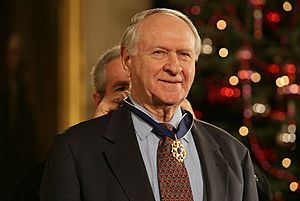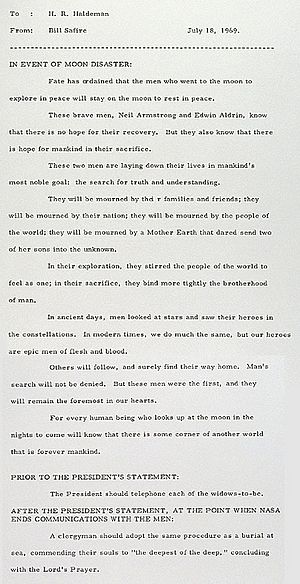William Safire facts for kids
Quick facts for kids
William Safire
|
|
|---|---|

Safire receiving the Presidential Medal of Freedom in 2006
|
|
| Born | William Lewis Safir December 17, 1929 New York City, US |
| Died | September 27, 2009 (aged 79) Rockville, Maryland, US |
| Occupation |
|
| Genre | Non-fiction |
| Subject | Politics |
| Spouse | Helene Belmar Julius |
| Children | 2 |
William Lewis Safire (born William Lewis Safir; December 17, 1929 – September 27, 2009) was an American writer, newspaper columnist, and journalist. He also worked as a speechwriter for presidents.
Safire was well-known for his political columns in The New York Times. He also wrote a popular column called "On Language" for The New York Times Magazine. In this column, he explored the origins of words (called etymology), new ways words were used, and other interesting facts about the English language.
Contents
Early Life and Education
William Safire was born in New York City. His parents were Ida and Oliver Craus Safir. His family had Jewish roots from Romania. Later in his life, Safire added an "e" to his last name to help people pronounce it correctly.
He went to the Bronx High School of Science, a special public high school in New York City. After high school, he attended Syracuse University for two years but decided to leave before finishing his degree. He later returned to Syracuse to give commencement speeches in 1978 and 1990. He also became a trustee for the university.
Safire's Career Highlights

Safire worked in public relations from 1955 to 1960. Before that, he was a producer for radio and television. He also served as a correspondent for the United States Army.
In 1959, he worked as a publicist for a homebuilder. This job led him to a trade fair in Moscow, Russia. There, he took a famous photo of Richard Nixon and Nikita Khrushchev during their "Kitchen Debate."
Working with President Nixon
Safire joined Nixon's presidential campaigns in 1960 and 1968. After Nixon won in 1968, Safire became a speechwriter for him and for Vice President Spiro Agnew. He is famous for creating Agnew's well-known phrase, "nattering nabobs of negativism."
Safire even prepared a special speech for President Nixon. This speech, called "In Event of Moon Disaster," was meant to be given if the Apollo 11 astronauts got stuck on the Moon. The plan included closing communications with the lunar module and a public ceremony. This shows how much thought went into preparing for every possible outcome during important events.
Journalism and Awards
In 1973, Safire started working for The New York Times as a political columnist. He later found out that his phone had been wiretapped by the Nixon administration. He wrote strongly about this, feeling upset that his conversations were listened to.
In 1978, Safire won the Pulitzer Prize for his commentary. This award recognized his excellent writing and analysis. He also often appeared on the TV show Meet the Press.
Safire was a member of the Pulitzer Prize Board from 1995 to 2004. After he stopped writing his opinion columns, he became the chief executive of the Dana Foundation. In 2006, President George W. Bush honored Safire with the Presidential Medal of Freedom. This is one of the highest awards a civilian can receive in the United States.
Writing About Language
Besides his political columns, Safire wrote the popular "On Language" column for The New York Times Magazine every week. He continued writing this column until he passed away. Many of these columns were later published in books.
Experts in language noted that Safire became more open to new ideas about how language works over time. He also wrote The New Language of Politics (1968), which later grew into his major work, Safire's Political Dictionary. This book explored how political words and phrases are used.
Political Beliefs
William Safire described himself as a "libertarian conservative." This means he believed in both individual freedom and traditional values.
Views on Presidents
After voting for Bill Clinton in 1992, Safire became a strong critic of Clinton's presidency. He often focused his criticism on Hillary Clinton.
Safire was also one of the people who supported going to war with Iraq. He predicted it would be a "quick war" and that Iraqis would welcome their liberators. He also believed that "freed scientists" would help find hidden weapons.
Safire was a strong supporter of Israel. In 2005, he received the Guardian of Zion Award. In 2008, President George W. Bush asked him to join a special group traveling to Jerusalem to celebrate Israel's 60th anniversary.
Death
William Safire passed away on September 27, 2009, at the age of 79. He died from pancreatic cancer in Rockville, Maryland. He was survived by his wife, Helene, their two children, Mark and Annabel, and his granddaughter, Lily.
See also
 In Spanish: William Safire para niños
In Spanish: William Safire para niños

